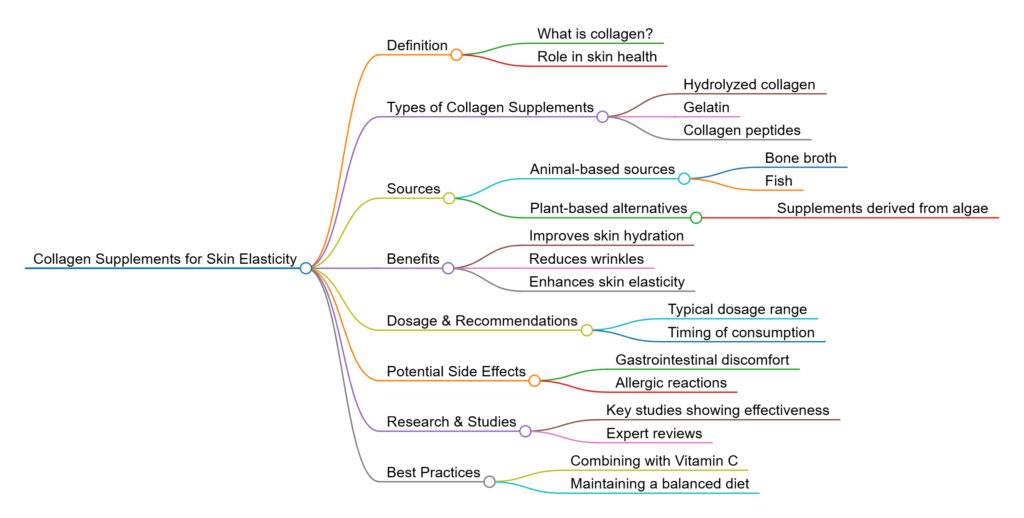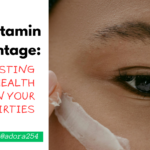Introduction to Collagen Supplements for Skin Elasticity
Collagen is the most abundant structural protein in the human body, making up a significant part of skin, tendons, and bones. Found primarily in the dermis, collagen forms a network that provides skin with its elasticity and strength—allowing it to snap back into place after stretching.
However, as we age, collagen production decreases, leading to wrinkles, fine lines, and sagging skin. Women, in particular, can lose up to 30% of collagen during the first five years of menopause, accelerating these signs of aging.

What Are Collagen Supplements?
Collagen supplements are typically derived from animal sources such as bovine (cow) or marine (fish). Available in powders, capsules, or liquids, they contain hydrolyzed collagen—collagen broken down into smaller peptides for easier absorption. Once ingested, these peptides are further broken down into amino acids, which the body can use to synthesize new collagen. Some studies suggest that these peptides might also stimulate the body’s natural collagen production, potentially enhancing skin elasticity.

How Do Collagen Supplements Benefit Skin Elasticity?
Research strongly suggests that hydrolyzed collagen can significantly improve skin elasticity and hydration. For example, a 2020 study by Sangsuwan et al. found that postmenopausal women who took 5 grams of collagen daily experienced a notable increase in skin elasticity.
Furthermore, a 2023 meta-analysis of 26 randomized controlled trials (RCTs) involving 1,721 participants supported these findings, revealing that hydrolyzed collagen improved skin hydration and elasticity compared to a placebo.
Interestingly, the analysis also showed that longer durations of collagen intake—over eight weeks—had a more substantial effect on skin elasticity than shorter periods, suggesting that patience is key for noticeable results.
Key Studies Supporting Collagen’s Benefits for Skin Elasticity
| Study Author | Year | Sample Size | Age Range | Dosage | Duration | Key Finding |
|---|---|---|---|---|---|---|
| Sangsuwan et al. | 2020 | 36 | 50–60 | 5 g | Not specified | Improved skin elasticity significantly |
| Bolke et al. | 2019 | 72 | ≥35 | 2.5 g | Not specified | Improved elasticity, hydration, and density |
| Proksch et al. | 2013 | 69 | 35–55 | 2.5 g, 5.0 g | 1 month follow-up | Significant improvement in skin elasticity |
| Inoue et al. | 2017 | 85 | 35–55 | Not specified | Not specified | Improved elasticity compared to placebo |
| Kim et al. | 2018 | 64 | 40–60 | Low molecular | 12 weeks | One-third of elasticity parameters improved substantially |
Optimal Dosage and Duration for Best Results
Most studies recommend a daily dosage of 2.5 to 5 grams of hydrolyzed collagen for improving skin elasticity.
Consistency appears crucial, with the most significant results observed after 8–12 weeks of continuous use.
Both bovine and marine sources of collagen seem effective, with no significant difference in benefits according to a 2023 meta-analysis.
Choosing the Right Collagen Supplement
To ensure quality and effectiveness, opt for hydrolyzed collagen from reputable brands that offer third-party testing.
Look for supplements that also contain Vitamin C, which supports collagen synthesis. Collagen powders can be easily mixed into smoothies, coffee, or water, providing a convenient way to incorporate them into your daily routine.

Safety Considerations and Side Effects
Collagen supplements are generally safe for most people. However, individuals with kidney issues or allergies to certain sources (such as fish or beef) should consult a healthcare provider before starting collagen supplements.
Excessive protein intake can strain kidney function, making it essential to follow the recommended dosage.
FAQs About Collagen Supplements
1. How long does it take to see results from collagen supplements?
Most studies suggest that noticeable improvements in skin elasticity and hydration can occur after 8–12 weeks of consistent use.
2. What is the best type of collagen for skin elasticity?
Hydrolyzed collagen, particularly types I and III, which are predominant in skin, has been shown to offer the most significant benefits for skin elasticity.
3. Are there any side effects of taking collagen supplements?
Collagen supplements are generally safe but may cause digestive discomfort in some individuals. Those with allergies to marine or bovine sources should exercise caution.
4. Can I take collagen with other supplements?
Yes, collagen pairs well with Vitamin C, which can enhance its absorption and effectiveness. Always consult a healthcare provider before combining supplements.
5. Do collagen creams work as well as supplements?
Topical collagen cannot penetrate deep enough to affect skin elasticity significantly. Oral collagen supplements are more effective in stimulating collagen production internally.
Conclusion: Collagen Supplements for Skin Elasticity
The scientific evidence leans favorably toward collagen supplements, particularly hydrolyzed forms, for improving skin elasticity. Consistency is key, with daily doses of 2.5 to 5 grams over 8–12 weeks showing the most promise. For the best results, choose high-quality supplements, pair them with a balanced diet, and maintain a comprehensive skincare routine. As always, consult a healthcare provider to tailor a collagen regimen that suits your individual needs.





[…] Regeneration: It supports cell growth and regeneration, ensuring that hair follicles are healthy and […]
[…] is a protein that provides structure to the skin, keeping it firm and youthful. As we age, collagen production decreases, leading to sagging and wrinkles. Collagen peptide supplements can replenish these levels, […]
[…] Time to Take: MorningWhy: Biotin (Vitamin B7) and B-complex vitamins convert food into energy, making mornings ideal. They also support keratin production for stronger […]
Thanks for sharing. I read many of your blog posts, cool, your blog is very good. https://accounts.binance.com/ar-BH/register?ref=S5H7X3LP
Your article helped me a lot, is there any more related content? Thanks! https://accounts.binance.com/kz/register-person?ref=K8NFKJBQ
Thanks for sharing. I read many of your blog posts, cool, your blog is very good.
Downloading 777pubcomdownload now. Hoping for a smooth installation and some big wins! Download it right here: 777pubcomdownload
Your article helped me a lot, is there any more related content? Thanks! https://accounts.binance.info/pt-PT/register-person?ref=KDN7HDOR
Thanks for sharing. I read many of your blog posts, cool, your blog is very good.
I don’t think the title of your article matches the content lol. Just kidding, mainly because I had some doubts after reading the article.
Gotta say, jl333 has a decent selection. Not the biggest, but the games they have are well-made. Smooth performance, which is a big plus in my book. Definitely worth a look! jl333
Just spun some reels on 88vin.stone. UI is solid, payouts aren’t too shabby. Definitely worth a punt. 88vin.stone
Your point of view caught my eye and was very interesting. Thanks. I have a question for you. https://www.binance.info/en-NG/register?ref=YY80CKRN
Your point of view caught my eye and was very interesting. Thanks. I have a question for you.
Your point of view caught my eye and was very interesting. Thanks. I have a question for you.
Your article helped me a lot, is there any more related content? Thanks!
Ma777: The Best Legit Online Casino in the Philippines for GCash Slots & Secure Gaming. Experience ma777 online casino, the best online casino Philippines for secure gaming. Use your ma777 login to enjoy legit online slots Philippines and seamless GCash online gambling PH today. visit: ma777
Can you be more specific about the content of your article? After reading it, I still have some doubts. Hope you can help me.
Thanks for sharing. I read many of your blog posts, cool, your blog is very good.